An Spailpín Fánach boarded a city imp bus in Dublin city centre this evening at sevenish on his long journey home from another day's slavery in the Salt Mines. I made my way to the back of the bus to find living space, eventually squeezing in beside a Russian welterweight who had a bagful of teddybears - to remind her of the motherland, no doubt. I stuck my snout in my book, as is my custom and advice to all commuters, and switched off from my environment.
Until I was dragged from the 16th Century to the back of a city imp bus in the 21st Century by the wailing and squealing of an infant on the back seat of the bus. I glanced up at him, and understood all. This was a bad boy - he's a bad boy in the sense that if his parent(s) brought him to visit middle-class you in your middle-class home, his squawking would cause middle-class mortification, and you would remark, on his exit, that Mrs Whatever is letting that child run wild, wild! But that's not a bad boy in this young fella's world - not being so strung out on smack so that you look for all the world like a tracksuited rat, twitchy, furtive and utterly useless, is not being a bad boy in this young fella's world. Anything else is very small beer indeed, such as being loud and rude and a pain in the ass on the bus home from town in the evening.
I started to feel sorry for the poor little hoor then. What chance has he, really? Not only is he doomed, he doesn't even know he hasn't a hope, thus damning his chances even further. I looked further for the mother - spotted her easily sitting in the corner beside him. Fat, tracksuited, blinged, pasty complexion, careworn, beaten. You know the type. And then I started to feel sorry for her - you can't even look after yourself, I thought, and now you're in charge of this fella as well? Musha God help you.
I looked back at your man. He was slugging the last of his bottle of Sunny Delight, the head tipped back, the bottle tipped up to its extremity so as not to miss a drop of industrially treated chemical goodness. Ara God help him, I thought, and his poor mother -
My reverie was stopped suddenly, when I looked back at Ma, and saw that she was now a mirror image of the young fella - head tipped back, and chalice tipped back so as not to miss a drop. But where the young fella was treating himself to a spot of Sunny Delight, this lady was refreshing herself with a 5o0ml can of Budweiser, the king of beers.
Call An Spailpín Fánach an old fuddy-duddy if you must, but the back seat of a bus at seven o'clock in the evening while in charge of a five or six year old child is no place to go on the beer. "These are thy Gods, O Israel," I muttered to the Russian girl, my hopes for social justice about as likely as my hopes of playing at stand-off half for the Lions in South Africa in 2009.
She smiled at me - a nice smile. She was pretty, even if a little fonder of the buns than was good for her. I smiled back.
"I said 'enjoy the city,' ma'am," I said as I rose to leave. "It'll be yours in ten or fifteen years' time. We'll never hold it."
I walked off into the night. Oblivious, Mummy took another belt of her Bud.
Wednesday, November 30, 2005
Growing a Social Conscience While Travelling with Dublin Bus
Lines on the Death of George Best

George Best, you’ve left us; you gave us such joy.
Defender, rest easy. Barmaid, take your rest.
No further to tremble at that wild Belfast boy,
He’s no more to taunt you, that genius, George Best.
His hair too long, his own life too messed,
Ron Harris bamboozled, feet spurning the grass,
The world to command, with looks and talent blessed.
At full-time, these things could he never pass,
A nightclub and a model and a bottle and a glass.
©An Spailpín Fánach, 2005.
Tom Wolfe on the Simpsons
I read in my LA Times this morning that Tom Wolfe, the greatest American writer of his generation, is to make a guest appearance on The Simpsons, the greatest TV show of our, or any other, generation. Gore Vidal, who thinks he's the greatest American writer of his generation, will also be on the show, which is good news in that if he's taping an episode of The Simpsons it means he isn't writing another one of his awful books. An Spailpín Fánach generally operates a one-hundred-page rule, in that if a book doesn't capture my interest after one hundred pages, my conviction that life is short means that I abandon it, and start another.
I had a go at Burr, by Gore Vidal once, and I did not get past the first page. Fact.
Tom Wolfe, of course, is a joy always. I Am Charlotte Simmons is currently sitting proudly on my to-read shelf, and I am looking forward to it hugely. If you haven't read The Right Stuff or The Bonfire of the Vanities of some of Tom Wolfe's collections of journalism, do so at your earliest convenience. You'll learn a lot about the modern world.
In the LA Times interview, Tom Wolfe says that The Simpsons is "the only show of any sort that I watch on television," and gets into the spirit of the thing. Just as his yellow Springfield self is about to be flattened by a boulder, Wolfe shouts "Aaaaagh! My suit - it's gaberdine!"
Gore Vidal, of course, doesn't watch The Simpsons. Which might explain why he writes such awful books.
Tuesday, November 29, 2005
Team Aniston v Team Jolie
There's a nice and frothy piece of fluff writing in today's London Times by Chris Ayres about how the human race in currently divided into two races of men; those that support the actress Jennifer Aniston, and those that support the actress Angelina Jolie.
Normally, of course, An Spailpín Fánach muses at a far higher level than celebrity gossip, but the Ayres is so well judged, and in such a contrast to Miss Fitzgerald blundering about like a cow in a china shop in the Indo article referred to earlier in these fora, I thought we all deserved a little treat.
Ní a'Tí
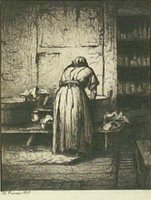 Bhí bhur Spailpín Fánach gafa idir an gol agus an gáire tar éis an sliocht seo a léamh ins an Irish Independent ar maidin inniú. Scríobhann Jacqueline Fitzgerald faoin léíriú ag an ESRI a fhoilsiú inne ag rá go ndéanann mná na hÉireann i bhfad níos mó obair bhaile ná mar a dhéanann fir na hÉireann. Cuirtear an t-amhrán "The Bogs of Mayo" in aigne an Spailpín nuair a léigh sé í, agus an amhránaí ag tabhairt aire dona deirfiuracha gan bac leis na fir ar chur ar bith:
Bhí bhur Spailpín Fánach gafa idir an gol agus an gáire tar éis an sliocht seo a léamh ins an Irish Independent ar maidin inniú. Scríobhann Jacqueline Fitzgerald faoin léíriú ag an ESRI a fhoilsiú inne ag rá go ndéanann mná na hÉireann i bhfad níos mó obair bhaile ná mar a dhéanann fir na hÉireann. Cuirtear an t-amhrán "The Bogs of Mayo" in aigne an Spailpín nuair a léigh sé í, agus an amhránaí ag tabhairt aire dona deirfiuracha gan bac leis na fir ar chur ar bith:
"To the pub every evening mo dhuine does go
While I'm rocking the baby on the bogs of Mayo."
Tháinig brón mór ar an Spailpín nuair a chonaic sé go raibh drochscéal na mbán comh dona sa lá atá inniú ann ná mar a bhí sé ins na caogóidí. Lean sé ar aghaidh ar selig, chun níos mó a fhail amach faoin léiríu ESRI (Gender Research Unit) tubáiste seo.
Fuair sé na h-uimhreacha ins an Irish Times, i sliocht ag Frank McNally. Scríobhtar ansin go gcaitheann na mná cúig uair a chlog gach lá seachtaine ag ní a dtithe, i drochchomparáid leis na fir, a chaitheann uair agus leath. Ní aithríonn na h-uimhreacha seo ach beagán ar an ndeireadh seachtaine.
Spéisiúl go leor. Comh spéisiúl, ar ndóigh, gur thóg an Spailpín amach a áíreamhán agus bhuail sé cúpla chnaipe. Tuigim as seo go gcaitheann mná na hÉireann cúig uair is trocha ag ní a gcuid tí, ach is docha go bhfuil sé níos mó mar sin mar, cé nach ndéanann An Spailpín Fánach, mar is buachaill é, pioc tada níochán, déanann sé an chuid is mó den phioc tada sin ar an ndeireadh seachtaine. Ag feachaint ar an léiriú seo, caithteamar daichead uair a chlog in Éirinn ag ní ár gcuid tithe.
Cad atá ar siúl i dtithe na Éireann nuair is gá dúinn seachtain oibre, daichead uair a chlog, ag ní? An bhfuil na muca isteach againn ins na tintéain mar a bhíodar fadó? An bhfuil clabárchoraíocht ar siúl i dtithe na hÉireann um tráthnóna, in ionad an paidrín a rá mar a bhí fadó? Nó an bhfuil uimhreacha, léiriú agus gach aon rud eile ag baint le Gender Research Unit an ESRI ina phraiseach ceart?
Fagann bhur Spailpín Fánach le huacht nach bhfuil duine dá laghad, idir fir is mná, ag caitheamh cúig uair a chlog gach chuile lá ag ní a theach féin. Níl an t-am acu ar dtús - más gá duit taisteal chun obair thuas anseo i mBleá Cliath, agus tú amach ón leaba ag a sé agus abhaile arís ag a seacht tráthnóna, cá gheobaidh tú an t-am chun dul ag ní? Más féidir le éinne cúig uair a chlog gach lá ag ní a teach, b'fhéidir go seolfá a h-ainm chugam? Tá aithne agam ar cúpla ospideal ina bhfuil an galar MSRI ina rí ann - bá bhreá doibh 'sna h-oispidéail sin sármná níochána dul isteach agus an ruaig a chur chuig an galar uafásach sin.
Monday, November 28, 2005
Looking for a Start in the Smoke
There's a marvellous article in this morning's Washington Post about the huge population of people that's moving from Eastern Europe to Ireland to find work. The writer, Kevin Sullivan, follows a guy called Janis Neulans on his way from Riga to Lucan, and extrapolates then from Neulans' micro-case to the macro-case of how Europe is changing. The parallels with Neulans' journey and experiences here are so close to our own emigrant stories as to be frightening (Kilkelly, Ireland, eighteen and sixty, my dear and loving son John. Dear God).
Fascinating, informative, well-written, insightful, thoughtful, all in just twenty-five hundred words. Makes you wonder why we never read this sort of stuff in our own media, as we ourselves are surely the ones most affected by these demographic changes. Funny that.
Tuesday, November 22, 2005
Ceist Cé Imreodh Rugbaí?
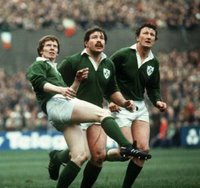 Tháinig scamall dubh eadóchais ar lucht tacaíochta rugbaí na hÉireann nuair a d'fhógair Eddie O'Sullivan a fhoireann a n-imríodh i gcoinne an Rómáin an Sathairn seo chugainn. Tar éis an dhá theip i gcoinne an Astráíl agus an Nua-Shéalainn, bhí na tacadóirí ag tnúth le tús nua. Níl stár nó trádisiún rugbaí na Rómáine comh fada ná stár rugbaí na hÉireann agus, mar sin, beirfidh Éirinn an bua is cuma cé h-iad na h-imreoirí a chaithfidh na geansaithe glása. Ba seans é an cluiche seo d'Eddie agus don IRFU imreoirí óga nua a chur amach, chun blás an lá mór i Lansdowne Road a thabairt dóibh.
Tháinig scamall dubh eadóchais ar lucht tacaíochta rugbaí na hÉireann nuair a d'fhógair Eddie O'Sullivan a fhoireann a n-imríodh i gcoinne an Rómáin an Sathairn seo chugainn. Tar éis an dhá theip i gcoinne an Astráíl agus an Nua-Shéalainn, bhí na tacadóirí ag tnúth le tús nua. Níl stár nó trádisiún rugbaí na Rómáine comh fada ná stár rugbaí na hÉireann agus, mar sin, beirfidh Éirinn an bua is cuma cé h-iad na h-imreoirí a chaithfidh na geansaithe glása. Ba seans é an cluiche seo d'Eddie agus don IRFU imreoirí óga nua a chur amach, chun blás an lá mór i Lansdowne Road a thabairt dóibh.
Ach níor thóg Eddie O'Sullivan an seans sin. Tá seans maith ag an bhfoireann a d'fhógair Eddie imirt i gCraobh na Sé Náisiún, tá sé comh fada ar an mbealach anois, agus comh cleachta i gnó rugbaí idirnáisiúnta. Níl ach fear nua amháin ann, an tUlach Kieran Campbell atá chun imirt lena chara chuige, David Humphries, agus an tUmph curtha ina chaptaen Dé Sathairn. Ba imreoir den chéad scoth é David Humphries, ach ní fhóglaimfear rud ar bith nua faoi tar éis an cluiche Rómáine. Cén fáth nár thugadh seans d'fhear éile? Cén fáth go bhfuil imreoirí comh cleachta mar Peter Stringer, Girvan Dempsey, Ronan O'Gara agus Simon Easterby ar an mbinnse? Ar bhfuil faitíos ar an Súilleabhánach go mbeidh foireann na hÉireann i dtróblóid Dé Sathairn, agus beidh ar O'Gara no Girvo an lá a shamháil?
Má tá, tá rugbaí na hÉireann i bpraiseach i bhfad níos measa ná mar a thuigtear. Tá dhá fhreagra ann chun an foireann seo a míniú. Is é an chéad míniú ná gurbh amadán ceart é an Súilleabhánach, míniú eadóchasach ach b'fhéadair go bhfuil an ceart ann. Tá an dara míniú níos eadochasaí - tá an foireann seo ag imirt Dé Sathairn mar níl éinne eile ann ab fhéidir leis an Súileabhánach a chur isteach.
B'fhéídir gur fheach Eddie O'Sullivan agus fir mhóra an IRFU ar gach imreoir féideartha, agus níl an scíl acu. Mar sin, is gá duinn cad atá againne a úsáid go dtí go dtagann imeoirí níos fearr, cosúil le foireann iomaint Uíbh Fháilí. Bhí Jerry Guscott, Austin Healey agus Brian Moore ar an mBBC Dé Domhnaigh, scóth na h-imreoirí rugbaí go leir (seachas an tÉileach, ar ndóigh), agus iad ag plé cluichí an deireadh seachtaine. Iarradh ar an Mórgach cathain ba cheart d'Éirinn a foireann a athrú, agus Corrán an Domhain ag teach i 2005. "Tá sé ró-dheanach dóibh anois," arsa an Mórgach. Sin drochscéal duit agus tú ag feachaint ar Éirinn ag strácáil leis an Rómáin Dé Sathairn.
Thursday, November 17, 2005
Willie O'Dea
Anyone unaware that the current Minister for Defence, Willie O'Dea, is a proud son of Limerick will have their doubts comprehensively dispelled by the picture of Minister O'Dea on the front page of this morning's Irish Times.
What a maroon, as Bugs Bunny likes to remark in similar cases.
Tuesday, November 15, 2005
Behind the Wire at the Railway Cup
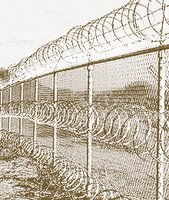 An Spailpín Fánach damn near spat his morning cheroot right across the room this morning on reading a very self-congratulatory report in his Irish Times about the Railway Cup football final, played last Saturday in Dublin's Parnell Park.
An Spailpín Fánach damn near spat his morning cheroot right across the room this morning on reading a very self-congratulatory report in his Irish Times about the Railway Cup football final, played last Saturday in Dublin's Parnell Park.
"McEniff Sees Progress as Crowds Return," reads the headline, and the body of the text says that "a combined total of well over 12,000 supporters [have] attended the three M Donnelly Interprovincial football games this season," an attendance which that grand old man of football, Brian McEniff lauds as "a great boost for the Railway Cup."
You'll notice that one of the reasons why McEniff is such a great man is that he refers to the Railway Cup as just that, and not this spurious occupants of interplanetary craft mararkey. What caused the gag reflex in your correspondent is this joy at the size of the crowds. I can't (nor wish to) speak for the majority of citizens of Dublin, but I can assure Brian McEniff, the GAA, M Donnelly and all associated bodies that the crowd would have been bigger at the Railway Cup Final by two, at the very least, if the GAA, in its wisdom, would only open the fecking gates so people could go in.
The situation is this. An Spailpín Fánach and a very dear and close friend, Banríon Mhór na gCispheileadóirí, had decided, early in the week, that if we could not score two tickets for the rugby (and what a mixed blessing that might have proved, eh?) we would stroll up to Parnell Park and take in the Railway Cup final. Nothing much else to do in Dublin on a Saturday night, you know. The rugger did not work out, which leaves us, at about seven on Saturday night, with An Spailpín cooling his heels in his Dublin domicile, and BM na gC gunning her motor back to Dublin, the cabin no doubt clouded in cooling clouds of mentholated tabaccy smoke.
An Banríon arrived in the door at eight, and we decided that we'd head up to the game. We had missed the first half, but nothing could be done about that now. And at least we'd see the end, and the presentation of the cup.
We drove up to Parnell Park, and fluked parking near the ground. We strolled down to the grounds, where we remarked on how quiet it was, especially considering that there was a football game on. Six thousand people were being terribly quiet. Still, on we strolled.
Until we were stopped by the great big gates and many miles of thorny wire that surround Parnell Park. There was no way in.
We went around and around, but no point of admittance could we find. At one point, one of the great gates swung open, to allow certain urchins to exit. We started veering towards the light, but sentries must have sensed our movement just as the Ninja do, and they quickly swung the portal shut again. An Banríon looked at me; I looked back at an Banríon. We turned on our collective heels, and went back to the car, the cheers of the crowd not echoing behind us. At all.
I've spent the days since wondering what happened them when they didn't open the gates. They do it all the time at home. Here, in Dublin, that place that famously deserves to win an All-Ireland on a regular basis, they do not open the gates at half-time, and the reason can only be because if they did, no native would turn up for the first half. Instead, they'd huddle over their JP Blue butts down the road, rather as they do outside the bars at half-time on Sky Soccer Sundays, and wait there until they were sure of getting getting something for nothing. God help them.
Thursday, November 10, 2005
A Gleam of Sanity, in all the Muck
Maybe we won't disgrace ourselves as a nation on Saturday after all. The great Keith Duggan has a lovely piece in this morning's Irish Times about an All-Black visit to Ramelton in Donegal yesterday. The All-Blacks were paying tribute to Dave Gallaher, whose family emigrated from Ramelton to Canterbury in the 19th century. Gallaher returned to the British Isles as captain of the New Zealand "Invicibles" touring side of 1905, who won 35 of the 36 matches they played. Gallaher, who died in 1917 in Belgium in the Great War, remains a hero among his own, as the speeches by Sir Brian Lachore and Tana Umaga indicate. Thanks be to God, sighs a relieved Spailpín Fánach.
Wednesday, November 09, 2005
Have These People Ever Even Seen a Rugby Match?
 An Spailpín Fánach is bitterly disappointed to report the latest in this utterly spurious Tana Umaga controversy, as a well-known Dublin publican, one Charlie Chalke, is making a fool of himself by trying to cash in on this "poow Bwian O'Dwiscoll, rotten Tana Umaga" controversy. Chalke, who owns a scatter of pubs around the city, has banned Tana Umaga from every one of them, and put up posters to that effect. Ireland of the Welcomes, indeed.
An Spailpín Fánach is bitterly disappointed to report the latest in this utterly spurious Tana Umaga controversy, as a well-known Dublin publican, one Charlie Chalke, is making a fool of himself by trying to cash in on this "poow Bwian O'Dwiscoll, rotten Tana Umaga" controversy. Chalke, who owns a scatter of pubs around the city, has banned Tana Umaga from every one of them, and put up posters to that effect. Ireland of the Welcomes, indeed.
I wonder has Charlie also banned Colin Meads while he's at it? Meads is considered the greatest New Zealand rugby player of all time, but he's also the man that pulled the Australian scrumhalf Ken Catchpole from a ruck with such violence that Catchpole's groin muscles were torn, and Catchpole never played rugby again. Surely much worse than the six-month layoff expected for "Drico."
Maybe Charlie has also issued the dreaded vitiners' interdict on Francois "Mannetjies" Roux, presuming Roux has not moved on to that Great Veldt of the Sky of course? Who was Francois "Mannetjies" Roux? He was a fighter pilot who stuck a late head on the Lions' stand-off half Richard Sharp during the Lions' South African Tour of 1962. As recalled in the Observer last Sunday, the tackle on Sharp was so late that even the Saffies blush at the memory, and those Saffies can be shameless customers at the best of times.
Dickie Jeeps, who played scrum-half on that 1962 Lions Tour, is quoted in the Observer remarking that something must be done before someone gets seriously hurt - meaning crippled or killed, of course. And Dickie Jeeps is right - the escalating violence, coupled with the escalating (supplement-driven) strength and power of rugby players, means that someone is going to seriously hurt unless the rules of the game are looked at, as, in fairness, the RFB are very good at doing. But when that rule revision is taking place, where will the band-wagon jumpers be then?
I can't believe that people are thinking of shelling out big money to go to Lansdowne Road solely to boo New Zealand, the greatest rugby playing nation in the world, and the greatest rugby playing nation in the world for the past one hundred years. But maybe that's just me being silly. They booed Martin Johnson when he arrived with Leicester last Spring, the only man ever to lead two Lions tours, and Zinezine Zidane was booed at Lansdowne Road in September at a soccer match. We have a lot to be proud of.
FOCAL SCOIR: The lonely Tana Umaga can take some comfort in the fact that he has literary company in his exile from Charlie Chalke's boozeramas - your humble correspondent was damn near ran out of The Bankers on Dame Street only this summer, a joint in Charlie's ownership I believe. It was eveningtime, and An Spailpín and a very dear friend met up after work for a chat and a gossip. We went to the Bankers; the lady had a glass of dry white wine, An Spailpín Fánach drank tea. After delivering our beverages, the waiting staff were hovering around our table for the next hour like we were valued members of the Travelling People, just dying to get us to move along, get along, move along, get along, go, move, shift.
Which is exactly what An Spailpín Fánach would have done, but the lady was made of sterner stuff. In a moment of mutual madness, the same lady briefly dated a very dear friend of your Spailpín Fánach, and that same man assured your chronicler of modern life and mores that, magnificent woman though she is, this same lady has got a bit of a temper. Spurned and seething in the Bankers, she considered the weapons available to her, made her choice and marched to the bar. She demanded the bar manager and, when that same scoundrel was produced, he got a both barrels of a Force Three Bollocking from the same lady. She informed him that she would not returning her custom, swivelled on the heel of a stylish shoe, and strode from the bar, head held high. There ain't nothin' like a dame.
Monday, November 07, 2005
Brian O'Driscoll - Lig Uait, a Bhrian, Lig Uait
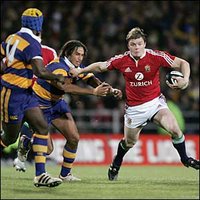 Dá ndéarfadh Brian O'Driscoll, captaen foireann rugbaí na hÉireann, focal dá laghad eile ar an bhfeall a dhéanadh air agus é ina chaptaen na Leon ar a dturas Nua-Shéalainne, ba cheart gúna na gcailíní scoile a chur ar a dhroim in aonad geansaí glas na hÉireann.
Dá ndéarfadh Brian O'Driscoll, captaen foireann rugbaí na hÉireann, focal dá laghad eile ar an bhfeall a dhéanadh air agus é ina chaptaen na Leon ar a dturas Nua-Shéalainne, ba cheart gúna na gcailíní scoile a chur ar a dhroim in aonad geansaí glas na hÉireann.
Sular chuaigh na Leoin go dtí an Nua-Shéalainn ba mhór an meas a bhí ag lucht rugbaí an domhain ar O'Driscoll mar imreoir den chéad scóth. Ba shoiléir go gcuirféa ina chaptaen na Leon é ins an tEarrach mar ba lear gurbh é O'Driscoll an t-imreoir rugbaí is fearr idir na ceithre thír a dhéanfadh suas foireann na Leon. Ach níorbh amháin í a imirt a bhí faoi taobh thiar tuairime mhóir na luchta rugbaí ar O'Driscoll - bhí pairt laidir ag a mhisneach, a chrógacht, fréisin i gclú O'Driscoll sa domhain rugbaí. Níorbh "fancy Dan" é; ní raibh eagla air ar an obair crua nó ar bhaol an rugbaí.
Tá an clú crógachta sin beagach cailte go leir ag O'Driscoll faoi láthair, ag is é a leabhair an fáth. Gach uair a oscailítear páipear nuachtáin nó a churtar an téilifis ar shiúl, seo é O'Driscoll ag caoineadh ar cad a thárla dó ins an chéad Chluiche Trialach amach ar thuaras na Leon. Cé gurbh uafásach an feall a dhéanadh air - agus ba fheall é, gan dabht ar bith - ní scríosfaidh an beicéal seo ó O'Driscoll as stár an tsaoil é. Tharla cad a tharla - is ceart do Brian O'Driscoll na h-eachtraí atá caite a chur taobh thiar dé, agus a aghaidh a thabairt ar an dtodhchaí. Ní dhéanfaidh na agallaimh agus na sliochta nuachta aon dífríocht ar a ghualainn nó ar a shaol, ach seans a thabairt dá criticeoirí a rá nárbh imreoir misneach é - éist ar a mbéiceal anois tar éis an samhraidh Nua-Shéalainne?
Cé gurbh uafásach an feall a dhéanadh ar O'Driscoll, ní cheart dearmad a dhéanamh gurbh cluiche foréigneach é an rugbaí, go tharlaíonn foréigean go minic i gcluichí rugbaí, isteach agus amach as dlíthe an cluiche. Sé tráidisiún an cluiche dearmad a dhéanamh ar eachtraí foréigneacha nuair a shéideann an fhéadóg dheireanach, agus eachtraí na pairce a fhágail ar an bpáirc. B'fhéidir nach ceart an rud é, ach sin mar a bhfuil ó lá William Webb Ellis, agus níl sé chun athrú ar ball.
Bhí Moss Keane ag caint le Matt Cooper ar a chlár raidio, the Last Word, tráthnóna Dé hAoine, agus a dhírbheataitnéas scriofta aige. D'iarr Matt ar Moss cad a shíl sé ar an bhfeall a dhéanadh ar O'Driscoll, agus an compairéad a dhéanamh idir an feall sin agus an feall a dhéanadh ar Willie Duggan, agus Duggan ar Thuras na Leon 1977. "Tháinig Willie ar ais," arsa Moss go cnéasta. Tar ar ais arís a Bhrian, agus déan dearmad ar 2005, Tana Uamaga agus Sir Clive Woodward. Níl aon maitheas ann.
Friday, November 04, 2005
Rome - The Miniseries
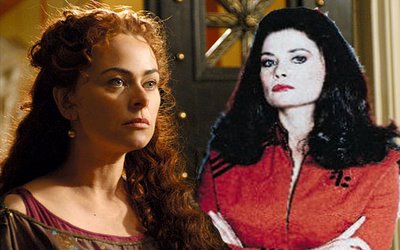
The Roman Republic lasted for the guts of five hundred years, from the overthrow of Tarquinius Superbus, the last of the Etruscan kings in the sixth century BC until Julius Caesar crossed the Rubicon and appointed himself Bosso Solo in the first century BC. Viewers of the new miniseries, Rome, on BCC2 on Wednesday night, will have felt every one of those five hundred long years go by during that first episode, and can only dread the dull and buttock-numbing horror of the eleven more episodes to come.
$100 million invested in sets does not great drama make, and if there is no great drama there is no earthy reason for the sensible viewer to leave the Champions League early to visit the Eternal City. With historical drama, the creators have three choices; they can go with the historical figures themselves, a la Neil Jordan's Michael Collins; tehy can concoct a rich stew of all sorts like Stanley Kubrick's Spartacus, or they can see the great world through the eyes of the little guy which, believe it or not, is the structure used in Ben-Hur.
It's the last-named that the producers of Rome have gone for, allowing us the point of view of two soldiers in the Army of the Republic, but they can't seem to stop themselves from reaching for the broad strokes of Spartacus, and end up where everyone ends up that falls between two stools - on the floor.
If the stories of the two soldiers are not in themselves interesting - and they are not - then what is the point of having them there? There is no point in having them there. The backstory - how a republic sank into tyranny - is plenty dramatic in and of itself, without having the action cluttered by the boring, boring antics of a cuckold and a drunk. Who cares?
There is only one character in the show that makes it particularly watchable, and she is Atia of the Julii (Atia Juliorum, surely? Tsk.), played with lip-smacking relish by Polly Walker. After a cursory glance at the script, Ms Walker clearly spotted the canine qualities of true dog, canus verus if you like, and as such she's decided to give Atia all the oomph she can muster. And that's some oomph - if she were a man, she would twirl a nonchalant moustache while expertly scheming and working her wiles. Think John Malkovich in Dangerous Liaisons and you're nearly there.
Ms Walker vamps it up to such a degree that your Spailpín Fánach - who is now as old as the very fog, you know - couldn't help but cast his mind back to Jane Badler's haughty and imperious performance as Diana, Chief Science Officer of The Visitors on the 'eighties sci-fi miniseries, V. All we need is a scene in which Ms Walker double-jointedly snaffles back a live hamster or two for the lunch and we will have a perfect match. Sisters under the skin.
Tuesday, November 01, 2005
Irish Transport Policy
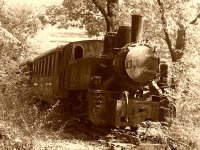 This surely is a great little nation. That Wise Old Owl of fiscal prudence, Minister for Transport Martin Cullen, today announced that the Government is to spend €34 billion on improving the Irish transport infrastructure. And isn't it badly needed, to link those blue and red hub towns that house all those decentralised public servants? Time for a reality check. As a nation, we've managed to build 22 miles of M50 motorway in 25 years. We've taken eleven years to build this LUAS that we're all clapping ourselves on the back about, despite the fact that all it's done is depopulate the bus routes proximal to either of its two lines. The LUAS effect on actual traffic is minimal. Decentralisation of public servants is a stupid idea in the first place, decentralisation of Dublin's urban sprawl will never happen as there are too many vested interests making too much money out of it, and An Spailpín Fánach is sick, sore and tired of listening to this shit all his life. I don't hear much yap out of Eddie Hobbs about all this either. Go bhfoire Dia orainn agus ar ár dtir bheag bhocht.
This surely is a great little nation. That Wise Old Owl of fiscal prudence, Minister for Transport Martin Cullen, today announced that the Government is to spend €34 billion on improving the Irish transport infrastructure. And isn't it badly needed, to link those blue and red hub towns that house all those decentralised public servants? Time for a reality check. As a nation, we've managed to build 22 miles of M50 motorway in 25 years. We've taken eleven years to build this LUAS that we're all clapping ourselves on the back about, despite the fact that all it's done is depopulate the bus routes proximal to either of its two lines. The LUAS effect on actual traffic is minimal. Decentralisation of public servants is a stupid idea in the first place, decentralisation of Dublin's urban sprawl will never happen as there are too many vested interests making too much money out of it, and An Spailpín Fánach is sick, sore and tired of listening to this shit all his life. I don't hear much yap out of Eddie Hobbs about all this either. Go bhfoire Dia orainn agus ar ár dtir bheag bhocht.


